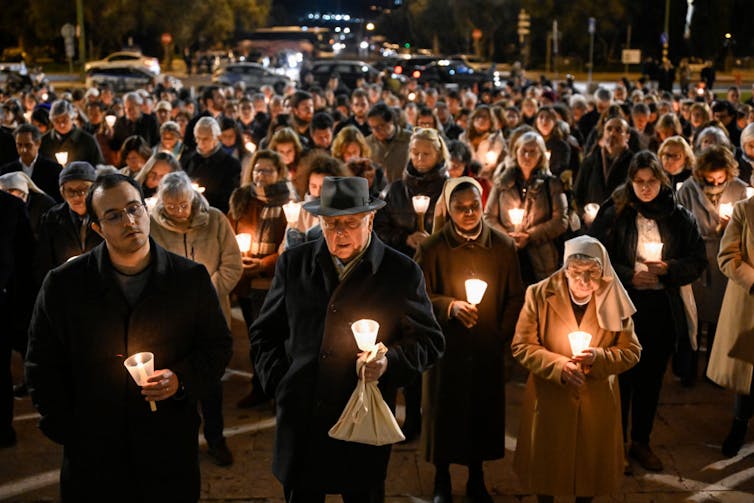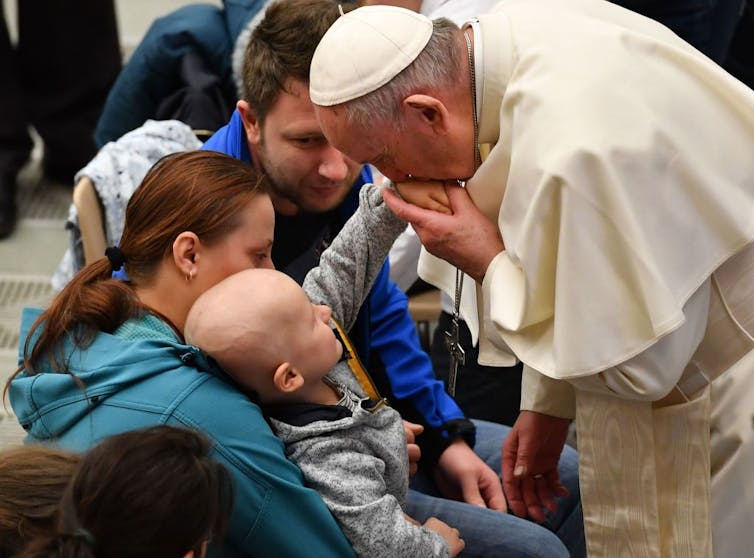(The Conversation) — Since Jorge Mario Bergoglio to start with stepped onto the balcony of St. Peter’s Basilica as Pope Francis on March 13, 2013, he has designed no shortage of statements that catch the attention of awareness. “Who am I to choose?” he famously stated about homosexual clergymen. “Nowadays there is an financial state that kills,” he after declared – a remark that led critics to rather implausibly label the pontiff a Marxist.
As the Argentinian pope methods the 10th year of his papacy, his positions on issues considered “political” continue to make their way into headlines. But as is the nature of headlines, the framework from which his positions emerge isn’t normally evident.
As a researcher of Catholicism, I’d like to get rid of some light-weight on a prevalent pattern in Pope Francis’ writings. It is a pattern that I feel is rooted in the pope’s spirituality as a Jesuit – a member of the Culture of Jesus — a Catholic religious purchase started by St. Ignatius Loyola in the 16th century.
Saint’s legacy
The “Spiritual Workout routines,” penned by St. Ignatius, is a manual to religious improvement that Jesuits and some others have utilised for generations. It encourages individuals to pay out thorough focus to the internal actions of the spirit or soul that condition their choices and steps.
The purpose of the step-by-step routines is to identify oneself as a sinner, but – crucially – a sinner liked by God. A “spiritual director” aids the participant to start with to identify brokenness in their existence, then to perceive God’s like by thinking about the lifetime of Jesus. Eventually, the exercise routines lead individuals to deepen their romance with Christ, so that they might discern how best to make selections.
Like a spiritual director, Francis’ very first step is usually to accept a “presenting difficulty,” as a medical doctor could possibly say: the symptom or apparent situation that is bothering another person. He then gets rid of superficial remedies that really do not deal with the fundamental “disease,” just before calling for a extra fundamental adjust.
In 2018, for illustration, U.S. bishops were being established to vote on two proposals associated to clerical sexual intercourse abuse: a code of conduct for clerics and new review boards to appraise bishops’ conduct. Commentators from all quarters howled when Francis halted the vote.

Portuguese Catholics hold candles through a vigil in Lisbon for the victims of clerical sexual abuse.
Horacio Villalobos/Corbis by way of Getty Photos
In its place, he insisted that the bishops go on a spiritual retreat. The church’s trustworthiness had been “undercut and diminished,” he warned. Francis named on them to relearn how to relate to 1 a different, and to lay Catholics, by shelling out time in prayer with the gospels, so that they would aim fewer on “pointing fingers” and additional on “seeking paths of reconciliation.”
With no that additional basic transform, Francis wrote, codes and boards could simply be about meeting company-design “standards of functionalism and performance,” and the contact to fundamentally mend interactions would go unheeded. Procedures could in fact be necessary, but not before the bishops reminded by themselves of their elementary task to observe Jesus in constructing interactions with a person a further and laity.
Numerous months afterward, the group adopted new rules for oversight of bishops. Critics argued the reforms did not go much more than enough, nonetheless, especially in terms of involving lay folks or legislation enforcement.
Going to the root
But the 2018 episode underscores a broader topic of Francis’ papacy: When accompanying a individual, the church or even the whole earth on a non secular journey, pointing out problems and tinkering with area-degree answers is by no means heading to be superior enough. What is required, he insists, is a heal for a further malaise.
As he said early in his papacy, describing the mission of the church right now, “I see the church as a field hospital after fight. It is worthless to check with a significantly hurt man or woman if he has higher cholesterol and about the stage of his blood sugars! You have to heal his wounds.”
In Francis’ eyes, the two the church and society are wounded, and the church does not stand aside from the world’s complications – in reality, it should not, mainly because it is Christ’s ongoing presence on earth. But equally need to acknowledge their deeper sources of brokenness in get to uncover true remedies.

Pope Francis blesses a little one attending the weekly common viewers at the Vatican in 2019.
Andreas Solaro/AFP via Getty Photos
This ethos is evident in Francis’ method to a person of the most pressing issues nowadays: weather adjust. In 2015, he issued the to start with papal document committed solely to ecological degradation. It starts, reported a critical adviser to Francis, with “a non secular listening to the outcomes of the very best scientific investigate on environmental issues accessible right now,” which demonstrates that our environmental situation is lousy and obtaining worse.
That is the presenting dilemma. A superficial response is purely technological: People can get ever bigger manage more than the all-natural environment and its modifications. The constructions ensuing from that eyesight of domination stand at the root of environmental degradation mainly because technological know-how on your own will usually occur up shorter, Francis argued.
To perceive the right place of technological innovation, the globe requires an “ecological conversion,” he wrote – a religious change so that folks perceive how “everything is related,” from honeybees and offer lines to compost and impoverishment.
This plan will come from the New Testament, he reported, which narrates Jesus’ “tangible and loving romance with the planet.” In the pope’s interpretation, simply because every little thing hangs together in Christ, the resource of all generation, every thing is interconnected. In truth, the pope’s attention to interconnectedness and therapeutic seems to guide his views on all the things from homosexuality to financial inequality.
Non secular director in main
A few months into Francis’ papacy, an interviewer questioned, “Who is Jorge Mario Bergoglio?”
“A sinner,” he replied, echoing Ignatius’ “Spiritual Exercises.”
After decades of practicing Jesuit spirituality, Francis has now expended 10 yrs as pope making use of all those techniques to a significantly more substantial viewers, reflecting on the further roots of brokenness in the world – and urging people towards basic transform.
(Timothy Gabrielli holds the Gudorf Chair in Catholic Mental Traditions at the University of Dayton. The views expressed in this commentary do not essentially replicate people of Religion News Services.)
